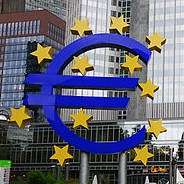Last week, European Central Bank (ECB) President Mario Draghi raised the possibility that the ECB might act to prevent deflation in the eurozone. In an email interview, Milton Ezrati, senior economist and market strategist with Lord Abbett and author of “Thirty Tomorrows: The Next Three Decades of Globalization, Demographics, and How We Will Live,” discussed the ECB’s monetary policy.
WPR: What economic concerns are driving the current debate over the ECB’s monetary and interest rate policy, and how are intra-European Union politics impacting it?
Milton Ezrati: The ECB has turned its major concern from economic matters, especially the goal of keeping inflation stable at close to 2 percent, to financial matters. It is striving to ease the financing burdens of the periphery’s beleaguered governments and their banks, which clearly need to recapitalize themselves. To pursue that effort, it has maintained a steady flow of liquidity into eurozone financial markets to keep them calm and to keep interest rates historically low. Of late, extremely low inflation and the threat of deflation have complicated the job, as deflation raises the real expense of any debt service. Also complicating the ECB’s job are intra-EU disputes. In particular, the more financially sound members, most notably the Germans, have complained that low interest rates help the borrowers of the periphery at the expense of their savers.

